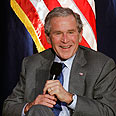
George W. Bush. Started it all?
צילום: AP
It started with Bush
Op-ed: Ex-president’s commitment to Iraq’s freedom paved way for latest Arab uprisings
The trigger to the 2011 Middle East revolution will be studied and scrutinized by historians for many years to come. There will be superficial views on the unraveling of events that point to a disgruntled peddler in Tunisia that kicked off a social tidal wave that rippled to Egypt, Yemen, Bahrain, Libya, elsewhere and back. Others will give exaggerated acclaim to an executive Egyptian tweeter and facebook activist that supposedly steered the masses to the streets.
Thomas Friedman of the New York Times is convinced that a 2002 report compiled by a group of Arab intellectuals for the UN was “prophetic” in warning us about all of this. As Friedman mentioned in a recent op-ed, the report pointed to three paucities in the Arab world — lack of education, lack of freedom and lack of women empowerment.
In fact, the report findings were well known for decades to anyone slightly familiar with the Middle East. Nothing substantial was ever done about it. The question is what set the stage for the 2011 Middle East rebellion? What made the masses move and believe they could succeed? In a more recent op-ed, Friedman insisted that the revolt began mainly because of Barack Obama, his skin color, his middle name and Muslim ancestry, Google, al-Jazeera’s coverage of Israel’s legal system, “Fayyadism” (as in Palestinian Prime Minister Salam Fayyad), and the Beijing Olympics.
Granted, the mentioned events, platforms, statesmen and their effect on the region may be of some significance; however, the Pulitzer prized publicist is off the mark. Above all else, this march for freedom started with the Surge.
In January 2007, with the number of US casualties in Iraq climbing, al-Qaeda affiliates taking over tribal areas, with all public opinion polls, political allies and foes telling George W. Bush to bring US troops back from an ill-fated war in Iraq - the president decided to surge. He sent over 20,000 additional troops to provide security to the battered Baghdad and Al Anbar Province, sending a clear message to the world: America backs its allies and knows that “freedom is not for free.”
Will Obama follow suit?
Bush’s most difficult decision during his two-term presidency was also his best one. It succeeded. Violence in Al Anbar decreased by more than 90%, tribal leaders restored control of their constituencies, Iraqi civilian deaths declined by 70% in Baghdad and 45% across the country, and perhaps most importantly, America proved it could be trusted.
That does not expunge the numerous things that went wrong in the US-led war in Iraq. First was the flawed premise of Saddam’s stock of mass destruction weapons. Second was the American-led decision to fire all Ba’ath party members and to completely disband the Iraqi army. There were also tactical tumbles with over-reliance on Special Forces while neglecting the show of a strong presence to confront crime and insurgency riddled cities. Mistakes are made in wars. Even in just wars like the war in Iraq, where over 4,000 US fatalities and more than 30,000 wounded soldiers proved to an entire region that the US is committed to freedom.
One can only hope that President Obama doesn’t distort that impression. That he doesn’t look the other way as Gaddafi kills thousands of civilians in Libya or turn his back once again on Iranian students who take to the streets. That he doesn’t give Saudi Arabia a blank check or enable the Iranian backed Shiites of Iraq to subjugate the Sunnis of that country. When the President of the United States is idle, the President of Iran is not.
As for that small yet significant country in the region called Israel, there is one very important lesson to be learned – Do not Deal with the Devil - even if it stems from peace-seeking pragmatism. It was tried with Arafat and Assad in the 20th century. It was morally wrong and practically counterproductive. It should not be attempted again with Assad junior or any other Arab ruler that oppresses his people. When Middle East freedom is finally found, peace between the people will follow.
- Follow Ynetnews on Facebook










